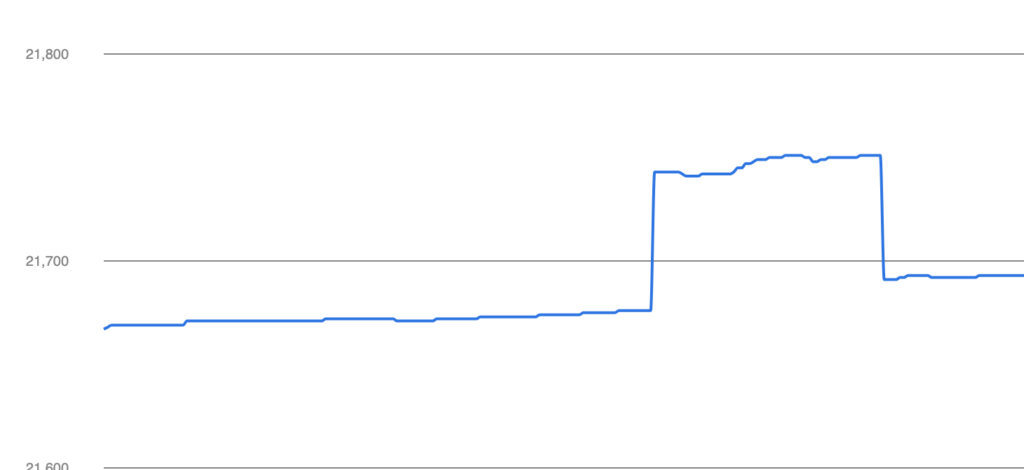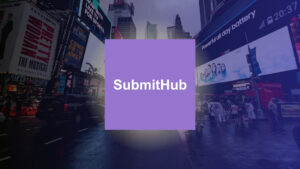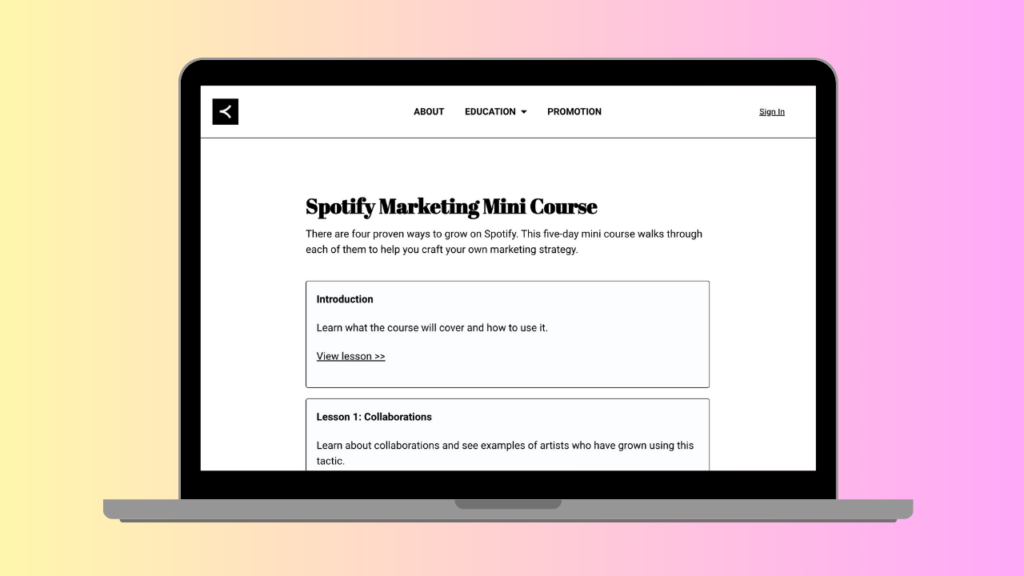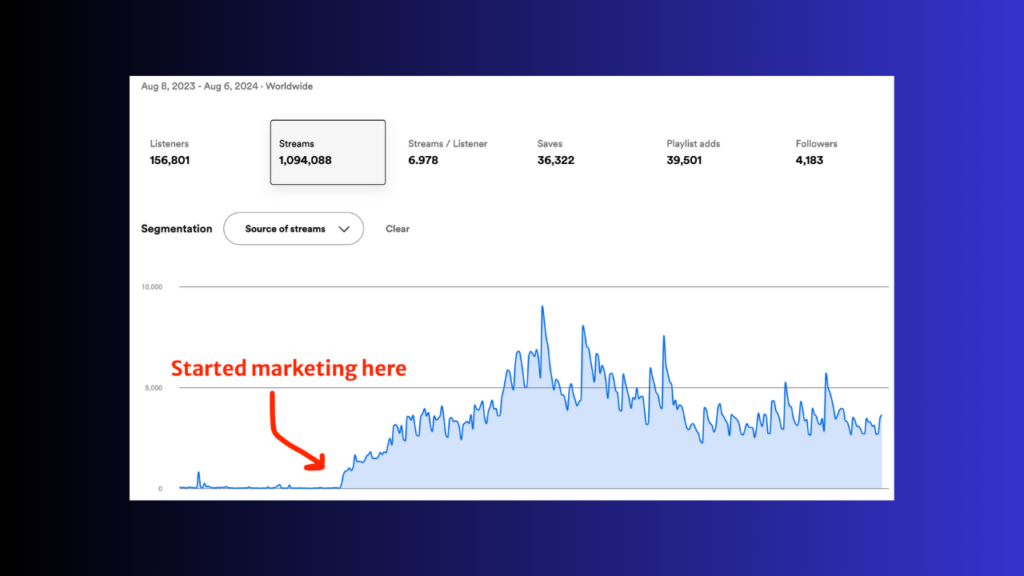Welcome back.
Last week, I used Labor Day as an excuse to avoid writing much of anything, and instead asked this email list three questions. Those three questions were:
In terms of your music marketing,
- What has worked for you so far this year?
- What has not worked?
- What do you have questions about?
A bunch of you responded with some very good thoughts. In today’s email, I’ll share a few of my favorite responses, plus my own thoughts, too.
Should be good. So, without further ado, let’s get into it.
What has worked for you so far this year?
Artist Response 1
“The one thing that sticks out most is becoming a playlist curator to help promote my band’s music.
I grew an indie rock playlist with sound-alike artists using Meta ads (via Hypeddit) and joined Groover. The result has been solid, generating a steady and consistent number of listeners to my band’s music. It also helped a establish a new floor: whereas in the past you were at the mercy of other curators, I now know that at worst, we can except X number of listeners from my playlist alone.
It also helped generate additional algo-based streams, largely from Radio since we’re helping Spotify understand what the band is relative to other artists.”
***
My thoughts
I feel like I’ve been beating this drum for most of the year. Building your own playlists and becoming your own curator is such a solid move; if I had to pick one marketing tactic to recommend, this might be it. If you haven’t tried it yet, now is the time.
And for all that, I still feel like I need to take my own advice and go all-in on this while it works.
***
Artist Response 2
“SubmitHub and, to a lesser extent, Groover have both given me a way of getting my songs onto the playlists of people most inclined to respond to them. That’s a big win.”
***
My thoughts
Funnily enough, SubmitHub and Groover were both named as examples of what’s working and what’s not working (by different artists, of course). Clearly, these platforms are mixed bags.
In general, though, it seems like most of you have found at least some success with submission platforms like these – once you’ve waded through all of the lame, negative, and sometimes condescending feedback, of course.
All right, onto our second question…
What has not worked?
Artist Response 1
“We don’t recommend you purchasing “likes” or followers on any platform. Made the mistake and bought followers on FB a while ago and that was a disaster from hell!”
***
My thoughts
Oh man, I totally disagree with this one. You should always purchase followers, especially if the person offering to provide them is wearing a balaclava.
Kidding, kidding.
In seriousness, this is a pretty obvious mistake to avoid. And I say that as somebody who has actually purchased followers in the past.
I haven’t told this story in a while, but when I was starting out, I purchased 1,000 followers on Twitter (this is back when it was called by its rightful name). I was trying to get some instant credibility so that when people googled my profile, they’d think I was legit.
I was not legit.
I got 1,000 followers, all right… overnight, in fact. But over the next three months, those fake followers dropped off one by one like the petals from a dying ox-eye daisy. By the next quarter, I was left right back where I started, only more aware of my own foolishness and with 200 fewer dollars to my name.
This will always happen when you buy followers on any platform. Sometimes you’ll lose the bought followers slowly, and sometimes they’ll die off all at once, like this:

But bought followers will always, always die off.
So please, learn from the stupid people like me who have gone before you. When that Fiverr seller in the balaclava approaches you with an offer that sounds too good to be true, just keep your $200 in your pocket and your pride intact and run the other way.
***
Artist Response 2
“Facebook ads has been an expensive mess for me. It starts off charging about $8 per conversion then moves down to about $2 per conversion.”
***
My thoughts
This is a good reminder for me; I’ve spent a lot of time over the past couple of years writing and talking about how effective Facebook ads can be.
But there’s nuance here. For one thing, getting ads to work correctly is really hard. For another thing… even when you know what you’re doing and the music is good, sometimes, Facebook ads just don’t work.
For instance, I’ve been struggling for the last few months to run ads for someone who’s making instrumental piano music. After a bunch of time and money, we still haven’t been able to crack the code – even though I’ve gotten instrumental music to work in the past, and even though I’ve personally managed probably hundreds of ad campaigns at this point.
I still think Facebook ads are one of the best ways to promote music in 2024. But they’re far from a silver bullet, and when they aren’t working, they’re a great way to flush money down the toilet.
Okay, onto our third and final question…
What do you have questions about?
Artist Response 1
“How do you scale playlists without spending a fortune?
Right now I own one indie rock playlist that has 2,000 followers and generates a fair number of streams for my band (approx. 900 per month) – but all of the money I’ve earned as a curator goes to this playlist.
Any advice on scaling the number of playlists you own?”
***
My thoughts
This is a great question. In my experience, there are really only two (legal) ways to make a playlist profitable:
1) Become a curator on as many legitimate platforms as possible – SubmitHub, Playlist Push, Groover, etc. – and process all of the submissions you get.
Is this fun? No. Will you end up feeling like a bad person while rejecting 99% of the submissions you receive in vague language that often accidentally slips into condescension? Yes.
But curating like a mad man is one path toward recouping your ad costs. The other path is to…
2) Have enough playlists with enough of your own songs to make significant money from streaming royalties.
This is hard, but depending on the size of your catalogue and the popularity of your playlists, it can be done. Here’s Jend again as a case study.
There is, of course, a third and perfectly illegal way to make a playlist profitable: Charge artists directly for inclusion. When they reach out, say that you’ll place them for $100 a pop, then watch the money roll in.
You can do this if you’re willing to sacrifice your eternal soul at the altar of money. Be warned that it will require you to wear a balaclava.
***
Artist Response 2
“I wonder what’s going to happen from a regulatory standpoint on the current payola system that clearly exists in music promotion.
No matter how it’s laid out, all of the playlisting placement services and pitching platforms are clearly pay to play. I get there has to be a form of gatekeeping with the logarithmic growth in independent music creation/release that’s occurred in the past decade, so it makes me wonder: Which side of the gate will get regulated first?
Will it be the curators of that released music, or will there be a standardization of the quality of music (mixing, production, mastering) that can be released?”
***
My thoughts
Ooh, this one got my wheels turning.
Disclaimer: I don’t agree that the current system is entirely built on ‘payola,’ although I guess it depends on how you define the term.
I do agree, though, that for many reasons the current system feels unfair and unsustainable. I’ve made videos and written about this. It will be interesting to see how the industry adapts.
I don’t have a magic eight ball, but here’s what I think will happen in the streaming world: Platforms like Spotify will increasingly crack down on both sides of the gate. They will be quicker to ban curators and remove bots, and they will be harsher on artists.
They will also increase standards for the quality of music that can be uploaded to their platforms, and they’ll find ways to cut back on royalty payments for music that doesn’t meet their subjective criteria. (In fact, Spotify has already done this; see the “Gaming the System with Noise” section of last year’s royalty change announcement.)
Last thought on this: Despite some folk’s best efforts (and some companies’ worst efforts), there will never be a perfect music industry system. In fact, over time, any system will begin to favor certain “winners” – even new systems which were initially introduced to be impartial and fair.
That’s probably a cynical take, and I don’t mean to suggest that we shouldn’t push for better things. We should.
But I have a hard time looking at history and thinking that, hey, if we could just switch to a user-centric royalty payout model, then everything would be wonderful.
And on that depressing note…
That’s all from the mailbag for today!
Thanks for reading, as always. And for those of you who sent your answers in, thanks so much for responding! Hearing your thoughts has been really helpful for me, and I’m hopeful that it’s benefitted others on this list, too.
You guys rock. Here’s wishing you good luck in figuring out this weird music marketing world, one day at a time.











